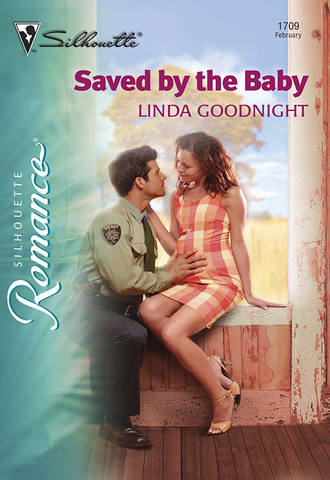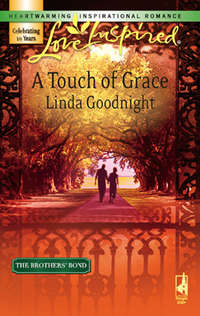
Полная версия
Saved By The Baby
Before she lost her nerve, Julianna settled back into the green chair and plunged into the story she’d rehearsed for days.
“I’ve come home to Seminole County to do some charity work. You know. One of those celebrity things that are good for an income tax break.”
She blasted him with a hundred-watt smile as fake as the words she’d spoken. She’d never done a “celebrity thing” in her life. Though she’d worked tirelessly to increase bone-marrow donors and had even headed a previous drive, celebrity had nothing to do with it. Outside the modeling industry and this small town she had no celebrity status, but Julianna prayed Tate wouldn’t know that. Finding cures for sick children had simply become her passion.
Tate arched an eyebrow. Stacking his hands behind his head, he tilted back in his rather bedraggled roller chair. “What could that possibly have to do with me?”
Julee crossed her arms over her middle. She hadn’t expected a red-carpet welcome after all these years, but his cool appraisal turned her butterflies into swarming buzzards.
Behind him, through the window, Julianna vaguely comprehended the ebb and flow of light traffic out on the street. A single horn honked. Car doors slammed. The quiet, unhurried normalcy of everyday life in a small town soothed her.
Normalcy—a condition she could hardly recollect. For a while three years ago, life had almost been normal. They’d been sure Megan had been cured by the chemotherapy treatments.
Then had come the frightening news two months ago that Megan’s leukemia cells had reappeared, throwing her into the desperate search for a bone-marrow donor, the only hope of cure now that chemo had failed to permanently destroy the disease. Until now they hadn’t even considered this last-ditch, drastic kind of treatment. For the first time Julee had no choice but to involve Tate. Megan was in a second drug-induced remission, but the doctors said it was only a matter of time until the cells began to multiply again. How much time, no one could say.
Not one day since then had they lived a moment without fear. Megan, her beautiful nine-year-old daughter, deserved a normal life, and so did dozens of other children awaiting a bone-marrow transplant.
If she could get Tate to donate blood without him knowing about Megan, everyone would be better off—Megan, Tate and his wife. No wife, however devoted, wanted the shock of discovering her husband had an unknown child by his first love. Plenty of reasons to face Tate’s chilly regard.
Leaning her elbows on a pile of official-looking documents Julianna locked eyes with the man who held Megan’s fate. The air conditioner thumped to life, but even the cool blast of air couldn’t counter the tingle of sweat prickling the back of her neck.
“I’m involved with increasing the number of minority donors for the bone-marrow transplant database. Since my hometown happens to be the tribal capital of the Seminole Indians, I thought this would be a good place to start.”
The chair rollers clattered to the floor. Tate frowned at her, puzzled, but clearly intrigued. The chatty clerk at the motel had been telling the truth; Sheriff McIntyre was a sucker for a good cause.
“Bone-marrow donation?”
“People wouldn’t necessarily be donating their bone marrow. At first, there’s just a blood test and the donor information is put into the data bank. Then if someone needs a transplant, doctors can access the data bank for a suitable match.”
“I thought relatives usually donated bone marrow.”
Julee’s pulse kicked up a notch, the falsely chipper smile tightening. “That’s the ideal situation, but sometimes family members don’t match.” Like me.
In a deliberate attempt to calm her fraying nerves, Julee picked up the paperweight from Tate’s desk and rolled it between her hands, watching snow drift over the pair of baying hounds. Was it her imagination, or could she still detect the warmth of Tate’s skin? Oddly, the thought calmed her.
“Any reason why you’re targeting minorities?”
Oh, yes, the most important reason in the world. Their daughter had Tate’s Seminole heritage and the genetic types that went with it.
“Minorities have a very limited donor system, so the chances of finding a match are almost nil. And because their population is small, we need all the donors we can get.”
“We?”
She shrugged, but her grip on the paperweight was tight enough to turn her knuckles white. She’d done fine without this man for nearly ten years. She had no desire to disrupt her life or his any more than necessary, but Tate’s cooperation could save Megan’s life. “I’ve been working with the bone-marrow registry for a while. Too many kids die who could be saved by somebody if only that someone had his blood type on file.”
Her heart had been broken a dozen times as beautiful children she and Megan had come to know had withered away while waiting for a transplant. Minority children especially lacked hope. Somehow, she had to change that.
“Why come to me? Why not go to the hospital or the Chamber of Commerce?”
“I have. The hospital administrator thinks it’s a great opportunity for PR. The bone-marrow people will send a mobile unit, the Saturn Company has signed on to sponsor, and we’ll accept regular blood donations, too, to help with expenses.”
He tilted back in his chair again, eyebrows knit in thought. Bright sunlight slanted in through the window behind him and gleamed off his almost-black hair. He picked up a pen and rotated it between his fingers. “Let me ask that again. Why come to me?”
“I’m lining up all the community and civic leaders. The mayor, the school administration, fire chief, etc. Since I’m especially interested in bringing the Seminoles on board, your influence…” At Tate’s thunderous expression, Julee clapped her lips together. She’d thought he was warming to the idea, but now the cold, shuttered expression returned.
“You’ll have to go to the BIA or tribal chiefs if you want the Seminoles. Don’t expect me to get involved.”
Her heart fell. “But I thought—”
“You thought what, Julee? That you could march in here and pretend ten years hadn’t passed? That I’d ignore the law-enforcement needs of this county to run around drumming up business for your tax break?”
“No! That’s not what I thought at all.” Where had she gone wrong? “As I said, you’re the sheriff, you have a certain clout that could be used—”
“Used? No thanks. Been there, done that.”
Julee squeezed her hands into fists, the long nails digging at her skin. She wanted to scream, to cry, to grab Tate and make him listen. Everything was coming out all wrong.
“That’s not what I meant!”
With a loud exhale, Tate held out a palm, peacemaker style. “Look, Julee, I don’t mean to be a hard case about this, but there are plenty of others to help with this cause of yours. I really am awfully busy, and given our history, I’d expect to be the last man on earth you’d come to.”
Their history was exactly why she had to have his help, but for Megan’s sake she dared not tell him that. Resuming perfect posture on the slick vinyl seat even while her insides howled in terror, she struggled for control and a serene façade. Any act of hysteria on her part was bound to make him wonder why he was more important than any other civic leader.
“We were once such good friends, I just thought—”
“Once,” he interrupted. “And once was a long time ago, a time I don’t care to revisit. Now, if you’ll excuse me…” He tossed the pen down and pushed upward from the desk. “I have to see a woman about a Peeping Tom.”
“Wait. Please.” But Tate was past listening.
Julee watched in dismay as the Sheriff of Seminole County, the man whose very blood she depended upon, grabbed his hat and, as if he couldn’t stand to be in her presence another moment, strode out the door.
Chapter Two
“He says he won’t help, Mom.” Julianna gripped the telephone receiver, trying to keep the panic at bay.
“He has to!” Beverly Reynolds’ strident voice pierced the distance from California to the Blackwood Motel.
“I know that, Mother,” Julianna cried. Then flopping back onto the standard green-and-brown motel bedspread, she relented. “I’m sorry. I’m just so scared. What if I can’t convince him to be tested?” She rubbed at the ache building between her eyebrows. “I don’t know what I’ll do.”
The motel television flickered to a commercial and Julianna saw her own legs hawking a new brand of depilatory cream. She turned away from the inane sight.
“I don’t know, either, honey.” Regret tinged her mother’s words. “If I hadn’t lied to everyone, especially Megan, you could come right out and tell Tate the truth.”
“I don’t want to hurt his family, but if he doesn’t agree to donate on his own, I’ll have no choice.”
“No! Absolutely not. You can’t risk it.” Julianna held the phone away from her mother’s screech. “The doctors have told us a dozen times how important a positive mental state is to Megan’s struggling immune system. Her health is too fragile to suddenly discover the father she thought was dead is alive and well in Oklahoma. Who knows what the shock might do to her?” A tormented sigh came through the phone lines. Julianna envisioned her mother repeatedly pushing short frosted hair behind one ear. “This is all my fault. I never should have started that lie.”
“You did what you thought was best at the time, Mama. I don’t blame you for any of this.”
When Julee had discovered her pregnancy and Tate’s marriage to another woman, her mom had created a deceased husband to save face in the new city and among new friends and co-workers.
“You were so young and so stubbornly determined not to ruin Tate’s chances for a football career. For a while I hated that boy. There you were pregnant, trying to succeed in this crazy modeling business, and wanting to spare the very boy who’d gotten you into trouble. I only meant to protect you and Megan from mean-spirited people.”
“I know, Mama, I know.” Julianna stared at the black spots on the ceiling tile. She’d relived those days in her mind a thousand times wondering what she could have done differently, and the answer always came out the same. She didn’t know.
Her mother hadn’t wanted her united with Tate, though she’d bitterly resented Julianna’s original plan to keep Tate in the dark. But Julee had feared what would happen if he’d discovered the pregnancy. He would have abandoned the athletic scholarship, his only opportunity to move beyond the horrible poverty and despair of his childhood. He would have gone back to work at the gas station and killed himself trying to care for a wife and a baby. In the end, after she’d reconsidered, he’d already traded her for someone else, so she lived with the lie created to protect them all.
“You never did approve of Tate, but he’s different now.”
“Different? Honey, Tate McIntyre was always different.”
“I mean different in a different way.” Julee laughed a little at that, comparing the almost military perfection of the Tate she’d seen today with the long black hair, the wary eyes, and bad attitude of the Tate she’d known ten years ago. “I don’t believe for one minute he’d intentionally hurt Megan. The bad-boy reject has become the golden savior and this town thinks he walks on water. From all appearances, he’s gentle and kind to everyone. Everyone but me, that is.”
“I don’t see why he should be angry with you,” Beverly sniffed defensively. “It’s not your fault he lost the football scholarship. And it sure wasn’t your fault he married that Atkins girl while you were still carrying his baby. I’ll never forgive him for that.”
“Mama, don’t go there. Please. I’ve had such a stressful day.” Gripping the phone a little tighter, she twisted the cord around her finger. “How’s Megan? Is she there?”
“No, she’s at school. Since you told her about having a bone-marrow drive where her daddy’s relatives lived, and explained how some of them could possibly match, she’s been full of zip.”
Julianna said a silent prayer of thanks. As long as Megan remained in remission, they had time to search for a donor. Her chest filled with a familiar mix of joy and pain. Being a mother was the hardest and most wonderful thing she’d ever done.
“Has she gained any weight?”
“In two days? Honey.” Her mother’s voice brimmed with sympathy. “Megan is like you. She’ll never fatten up too much.”
Julee had a vision of Megan’s wide, omnipresent smile in a narrow face with Tate’s high cheekbones and leaf-green eyes. Her arms hung like twigs from her T-shirt sleeves and she’d been bald so often, she’d taken to wearing a ball cap even when her hair had grown out. Julianna’s heart expanded with fierce mother love. Megan was an amazing kid, so full of life and love it seemed impossible that she could be dying.
“I have a meeting with the hospital administrator and the radio-station manager in a while, Mom, so I’d better get moving.” She sat up on the end of the bed. “Give Megan my love.”
“Try not to worry so much, Julee.”
“I won’t if you won’t.” It was an oft-repeated phrase.
“Everything is just dandy from this end. Eugene is coming over for dinner and afterward Megan and I have a hot game of Super Nintendo to finish.”
Julianna knew her mother and their affable accountant, Eugene Richmond, would be much more than friends if not for her and Megan. She had halfheartedly encouraged the pair to take their relationship further, but in truth, she couldn’t work the insane modeling schedules without her mom to help care for Megan. And with Megan’s hospital bills, every penny counted. When she’d discovered Julee’s pregnancy ten years ago, Beverly had moved to L.A. and become housekeeper and nanny while Julianna had provided the finances. So, adding to Julianna’s burden of responsibility, dear Eugene offered only friendship to the woman he wanted to love.
Replacing the receiver, she lay back on the full-size bed. Out of long habit she began the tedious exercises that kept her legs in high demand in commercials, magazine ads and movies. Sometimes, when she wasn’t worrying about Megan, she wondered what would happen when her legs gave out. How would she support her sick child? The agency loved her now because of the huge commission she brought in, but she had no illusions about this silly, shallow business of making a living with her body. She was a piece of meat. When the meat turned bad, she’d be nothing.
For the millionth time she wished she’d gotten an education, wished she’d chosen a career that made a difference in life, wished she’d been a nurse or a teacher or something that mattered. Viciously, she bicycled the air. She was nothing, nothing, nothing, but a pair of legs.
Chapter Three
“Crown me.”
Tate groaned and gave up one of his checkers, clunking the piece down with feigned annoyance. “You’re cheating again, old-timer,” he said with affection to the man sitting across from him.
Every Tuesday at noon, rain or shine, Tate attended a Chamber of Commerce meeting in the conference room of Blackwood Community Center, then moseyed over to the Senior Room for a game of checkers or dominoes. Today former sheriff Bert Atkins, his friend and mentor, was beating the pants off him.
“Ha! Don’t need to cheat when you play this bad.” The older man chortled happily and popped another peppermint in his mouth—his crutch to avoid smoking. “You must be working on a case the way your mind is off somewhere. Anything I can help you with?”
Bert Atkins had served Seminole County as sheriff until his second heart attack had forced him to retire, but his mind was as sharp as ever. With uncanny accuracy, he always knew when Tate was struggling with a problem.
Tate was, in fact, working on a suspected chop-shop operation, though that wasn’t where his mind had been. He hadn’t quite pinned down the source yet, but if he was right, the kingpin was a well-respected citizen. Bringing him down would be neither easy nor popular. And this was an election year.
After frowning at the board for a moment he moved his black king, jumping two of Bert’s men. “Guess my mind isn’t as scattered as you thought.”
But to be honest, his mind was scattered. Julee Reynolds was driving him crazy. Since he’d found her slumped outside his door two days ago, looking like her dog had died, Tate had thought of little else. Having her name and the bone-marrow drive on the lips of every Blackwood citizen didn’t help much and he was feeling like the county jerk instead of the county sheriff because he didn’t want any part of either.
Bert slapped the table, sending the checkers into a quiver. “Gol’ dern it, boy. I’m gonna have to study on this next move.” He shoved a plastic bag in Tate’s direction. “Here. Have a peppermint while I think.”
Obliging, Tate removed the crinkling cellophane and welcomed the candy’s cool sweetness. While Bert studied, his snow-white head bent over the board, Tate looked around at the group gathered in the Senior Room. A half dozen men played various games at other tables. He’d worked hard to gain the respect of this town, and in return the citizens of Blackwood had been good to him. He was happy, content. Or at least he had been until Julianna Reynolds blazed into town and reminded him of the hole inside his chest.
At the far end of the long room a group of ladies chatted and crocheted around a sofa grouping. One of them looked up, caught his eye and waved. He knew by the way she elbowed her companion that the unattached sheriff of Seminole County had just become the topic of conversation.
With an inward groan, he waited. Who would it be this time? The new librarian? Or maybe Mary’s recently divorced granddaughter? The ladies of Blackwood found his lack of a love life intensely interesting and seemed determined to remedy the problem by throwing unattached females in his path.
Sure enough, before Bert had a chance to claim any more of Tate’s checkers, Mildred Perkins laid aside a long rectangle of pink fluff and headed in his direction. The busiest body in town, Mildred considered finding him a wife her sworn duty. They didn’t understand what he couldn’t tell them—he’d failed at love twice, and that was enough. He was good at a lot of things, but love wasn’t one of them.
“Sheriff,” Mildred began, fingering the eyeglasses that hung from a beaded chain around her neck.
“Mrs. Perkins,” he acknowledged politely. “How are you and the Crochet Club today?”
“Oh, we’ve nearly finished that blanket for Cindy’s new grandbaby. Which is what I wanted to see you about.” She twisted the chain into a knot. “Not the baby exactly, but Cindy. Did you see the newspaper today? Cindy was right on the front page. Right there with Julianna Reynolds.”
She said Julee’s name with such relish Tate flinched.
He’d nearly swallowed a doughnut whole this morning when Rita had stuck the paper under his nose, berating him for not taking a more active part in Julee’s charity blood drive. There was Julee, smiling fit to kill as she signed up folks for the big donor drive.
“Yes, ma’am. I saw that. Cindy looked mighty nice.”
“Cindy?” Mildred’s piercing voice shot up a notch. “Cindy? Land o’ goshen, Sheriff, I’m not talking about Cindy. I’m talking about Julianna coming back to Black-wood to help cancer victims. Isn’t that the sweetest thing you ever heard?”
“Yes, ma’am,” he agreed, keeping a bland expression while hoping Mildred wasn’t about to set him up with Julee. “Real nice of her.”
“Did you know the car dealership is having a drawing? The winner gets to drive a new car free for a whole month?”
“I’d heard that.” Who hadn’t? In two days time, Julee had turned the entire town upside down. The radio station blasted a reminder of the bone-marrow drive every fifteen minutes, the newspaper couldn’t seem to print enough rosy articles about the small-town girl who made good, and everywhere he went somebody reminded him of how sweet and perfect and single Julianna was. To hear them talk she was a cross between Mother Teresa and Sandra Bullock.
“Well?” Mildred crossed her arms over the huge red flower decorating her shirtfront and fixed him with a questioning stare.
He pinched his lips between thumb and forefinger and arched his eyebrows. Had he missed something?
“I didn’t see your name on the list of civic leaders who’ve signed up to donate.”
Tate sighed inwardly, guilt warming the back of his neck. He fiddled with a checker, sliding it back and forth along the edge of the board. “I didn’t see yours, either.”
“You gotta be under sixty,” she huffed impatiently. “And Lord knows I passed that a long time ago. You’re young and fit as a fiddle so you got no excuse not to help out those poor little suffering children.”
The guilt of worrying about those “poor little children” was eating a hole right through the smothered steak he’d had for lunch. “Needles make me nervous.”
Mildred laughed and patted his arm. “Oh, Sheriff, you big tease. I know you’ll do your part. Just have Julianna hold your hand while they poke you.” She beamed at the genius of her suggestion. “And afterward, the two of you can come over to the Bingo Game together.”
Bert clunked down another checker, taking one of Tate’s. “Mildred, you’re interfering with my concentration. Why don’t you be useful and go get me a cup of coffee?”
While Tate silently thanked his old friend for the change of subject, Mildred drew back like a hissing adder. “Bert Atkins, you go get your own coffee.”
With a huff, she flounced back to the circle of crocheting ladies who’d been acutely attentive during the brief exchange. Six smiles beamed their goodwill across the room. Mildred’s mouth moved non-stop while she looked at Tate with an expression that said she was certain—absolutely certain—he wouldn’t let her, or Julianna, down.
Sometimes Tate didn’t know whether to hug them or hate them. Dear sweet ladies who meant well, but somehow thought he needed their input in every facet of his life. Not that he didn’t appreciate their casseroles and pies and crocheted afghans. He did. But right now, the last thing he needed was another reminder of the woman he’d never been able to forget.
“Why not donate blood, Tate?” A checker in one hand, Bert paused. “Wouldn’t be the first time.”
Tate wallowed the peppermint with his tongue and pretended to study the checkers. “My deputies are helping out. I’m too busy to get wound up in Julee’s celebrity tax write-off.”
“Tax write-off or not, it’s a good cause. Just because you and Julee were an item way back when is no reason to avoid her now. Unless you still have feelings for her.”
Tate blanched at the plain speaking. Feelings? Heck, yes, he still had feelings for her. Trouble was, his feelings were all mixed up—fear, mistrust and a longing so fierce he’d been tormented all last night with dreams of Julee. He’d awakened in such a sweat he’d gotten up at 3:00 a.m. to take a shower. A cold one.
“As far as I’m concerned I’ll be glad to see her gone.”
“Question is, why?” Bert pointed a checker at him. “Shelly always said you never got over Julee.”
How could he explain that avoiding Julee was a matter of self-preservation? Learning to live without her ten years ago had nearly killed him, an experience he couldn’t afford to repeat.
“I wasn’t the right man for Shelly,” he said, skirting the issue of Julee. “You know it and so does she.” His brief and disastrous marriage to Bert’s daughter had been the final chapter in his book of love. Never again.
“A man can’t work 24-7 and keep a woman happy, that’s for sure.”
“Running a sheriff’s office is a full-time job. If anyone understands that, it’s you.”
“Being a good sheriff’s one thing, but I don’t recall ever sleeping in my office. You let this town run you ragged.”
“I owe them, Bert. Just like I owe you.”
The old sheriff had seen something worth saving in the rebellious youth, though for the life of him Tate couldn’t imagine what it had been.







